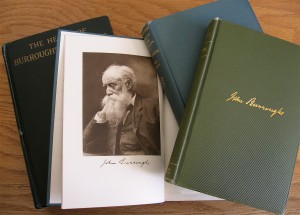Feb 19 2012
Reading John Burroughs
 Once again I am reading John Burroughs – a turn-of-the-century writer who practically reinvented the nature essay. Heavily influenced by Emerson and second only to Thoreau in his passion for the natural world, Burroughs has intrigued me for years. Yet I have shied away from him time and again, fearing that the yawning chasm between his work and modern sensibilities might prove infectious.
Once again I am reading John Burroughs – a turn-of-the-century writer who practically reinvented the nature essay. Heavily influenced by Emerson and second only to Thoreau in his passion for the natural world, Burroughs has intrigued me for years. Yet I have shied away from him time and again, fearing that the yawning chasm between his work and modern sensibilities might prove infectious.
More than one literary critic has called Burroughs “quaint” – a damning term to be sure. I cringe whenever I hear it. That’s like being accused of being both frivolous and irrelevant. Granted, the word might apply well to the many bird watching essays that made Burroughs so popular in his day, but it completely ignores the man’s more philosophical side. In the last few years of his life, that part of him really flourished.
John Muir and John Burroughs are the “two Johns” of late 19th, early 20th century nature writing. Most self-proclaimed nature lovers relate more to the former than they do to the latter. That’s because Muir was an activist in his day, a promoter of national parks and a founder of the Sierra Club. All that is much in keeping with the spirit of modern environmentalism. And Burroughs? Well, when he wasn’t writing pieces for mainstream magazines or hanging out with industrialists like Henry Ford, we was thinking too much. A quick perusal of Accepting the Universe, published shortly before his death, is proof positive of that.
Yeah, those of you who have read my heavier work know which side of Burroughs I prefer. In one essay he writes: “We cannot put our finger on this or that and say, Here is the end of Nature,” and I’m all over it. “The Infinite cannot be measured,” he adds, and I couldn’t agree more. Yeah, Nature with a capital “N,” going well beyond politics. Am I the only nature lover alive today who cares about the things that JB pondered in his old age? One of the few, certainly.
The essays of John Burroughs are good for the soul. I find his ruminating, rambling style a welcome change from the superficial, sensational nonsense so prevalent in the media today. So I will continue reading his work and thoroughly enjoying it despite the musty smell that emanates from the hundred-year-old books that I hold in my hands. Sometimes nothing will do but the classics.

